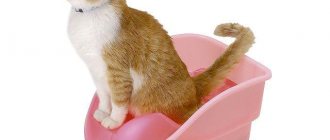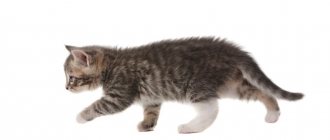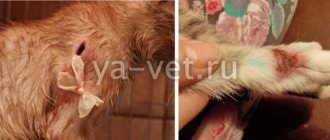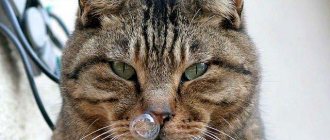It is important for cats to urinate regularly for their bladder and overall health. However, if you are going to be traveling with your cat for an extended period of time, you may be wondering how long she can go without peeing. Although cats generally take good care of themselves, they should not go more than 24 hours without urinating.
Here's what you need to know about your cat's bladder health, and steps you can take to keep them healthy and happy.
Why is constipation dangerous?
Defecation is a natural process through which the intestines are freed from processed substances. If feces are retained and not released for several days, this leads to severe intoxication of the body.
When a cat is constipated, bacteria that live in the large intestine release toxins, and waste bile contains breakdown products of hemoglobin.
If a cat cannot go to the toilet for a long time, and this happens often, this is bad. This means the pet needs help. After all, systematic constipation can lead to intestinal obstruction and internal bleeding.
How many days can a kitten go without walking (stress when moving)
Kittens visit the litter box up to 3 times a day. More or less is considered a deviation in the functioning of the digestive tract. The first option (increasing trips to the toilet) indicates poor functioning of the gastric mucosa.
Be sure to read:
Wood litter for cat litter: types, the best companies, how to use, pros and cons
The second option may be an indicator of more serious problems with the baby’s health:
- inflammation of the gastrointestinal tract;
- adhesive disease;
- hernia and scarring;
- swelling or rupture of the anal canal.
But don't panic ahead of time. Kittens also experience problematic bowel movements after a long trip, weaning from their mother's milk, or when moving to a new home. The pet needs to be given some time to adapt. If after this the animal suffers from constipation, it is necessary to consult a veterinarian.
Causes of constipation in cats
If your cat cannot go to the toilet in a big way, it is important to find out the cause of the problem. Constipation is not a disease, but only a symptom that indicates some kind of disorder in the body.
The main causes of constipation in cats:
- The pet drinks little. Due to lack of moisture, stool hardens and moves poorly through the intestines. This often happens when a cat is suddenly switched to dry food.
- Errors in nutrition. Feeding a cat food from the human table can lead to a lack of vitamins and microelements. Because of this, the functioning of various body systems, including the digestive system, is disrupted.
- Stress. A cat may experience constipation after experiencing a fright, a change of owner or place of residence, and a kitten may experience constipation after separation from its mother.
- Worms. Infection with parasites leads to disruption of intestinal function - stool becomes irregular, constipation alternates with diarrhea. In advanced cases, when there are a lot of helminths inside, they interfere with the movement of feces through the intestines.
- Taking diuretics or iron supplements.
- Low mobility. Elderly, pregnant cats, as well as cats with joint diseases have problems with bowel movements because they move little.
- Hairballs. Constipation often occurs due to obstruction of the intestines, as hair clumps accumulate in the intestines.
- Foreign body. If a cat swallows an object, this can also cause constipation.
- Scars in the rectum or anus.
- Distension of the intestines as a result of prolonged constipation.
- Diseases of the paraanal glands in cats.
- After childbirth and abdominal surgery, there are also stool disorders.
Attention! Older cats are more likely to be constipated. It is associated with weakened intestinal motility. In small kittens, this problem occurs due to imperfections in the digestive system.
Chronic diseases that can cause constipation in a cat
Often, constipation is accompanied by diseases that are associated with disturbances in the functioning of the endocrine system:
- diabetes;
- tumors in the rectum or anus;
- kidney pathologies;
- congenital anomalies of the gastrointestinal tract.
Spinal injuries, which damage the nerve roots of the spinal cord, lead to loss of sensation, and the cat cannot poop.
Why do veterinarians say different things?
Each veterinarian has his own point of view and his own level of knowledge, which is why they advise differently. Often this advice is harmful. This happens because feline nutrition is a subtle and new science: it is not studied in sufficient detail in veterinary schools. Yes, and everyone studied differently: some were excellent students, while others bounced from two to three.
Then doctors graduate and begin additional training at seminars and conferences, which are usually sponsored by feed manufacturers. As a result, doctors are provided with not entirely correct data and are mainly taught how to select medicinal foods in a given situation. Veterinarians come out of these seminars and begin to prescribe food to patients, as they were taught, but they cannot really advise on natural nutrition.
And often, after attending such seminars, veterinarians prescribe cereals, because this is what food manufacturers teach: the reason for this is purely commercial - manufacturers add grains to food in order to make the product as cheap as possible and put more money in their pocket. But this needs to be justified, which is why a theoretical basis is provided for the need for the presence of grains in the diet of cats.
At the same time, a veterinarian who knows little about cat nutrition can be an excellent diagnostician or surgeon. It’s just that dietetics is a separate topic and you shouldn’t judge a veterinarian by it.
Associated symptoms
Constipation does not necessarily mean a complete absence of bowel movements. Some cats have regular bowel movements, but very little feces come out. For this reason, the animal owner may not even be aware of the problem. It is important to find out in time that the cat has stool retention, before his condition worsens.
To understand that your pet needs help, you need to study the symptoms of constipation in a cat:
- the cat does not walk much for 48 hours;
- on palpation, the abdomen is enlarged and painful;
- the cat becomes restless and loses its appetite;
- the pet spends a lot of time in the tray, unsuccessfully trying to poop;
- the cat strains and meows pitifully;
- if the pet still manages to pass a large stool, then very little feces are excreted, it is dry and covered with cracks;
- there is blood in the cat's feces;
- the anus is hyperemic.
Attention! If a cat doesn't poop for more than 4-5 days, it's very bad. With prolonged constipation, signs of intoxication appear - lethargy, vomiting, and sometimes the temperature rises.
What to do at home if your cat is constipated
In most cases, it is possible to improve bowel movements with the help of nutritional correction, increased physical activity, massage and laxatives. If fecal retention in a cat is caused by intestinal pathologies or tumor processes, then only surgery will help.
In cases where prolonged constipation is accompanied by vomiting, the cat is given IV drips to prevent dehydration.
Normalization of diet
To help your cat with constipation, you need to change his diet. In the first days after symptoms are detected, it is advisable to switch your pet to liquid food. Food from the human table is completely excluded from the menu - semi-finished products, sweets, foods with added salt and spices, bones.
To loosen stools, you can give a little beef liver daily.
What to include in the diet of a cat with constipation:
- vegetables – pumpkin, spinach, carrots;
- fermented milk products - classic yogurt without additives, kefir, yogurt;
- vegetable oil – no more than 1 teaspoon per day.
It is very important to increase the amount of fluid consumed. The cat should be given purified raw water.
Veterinarians recommend placing several bowls of water in different places in the apartment.
Special feed
Cats that are accustomed to dry industrial formulas are given special food with fiber, vitamins and minerals. They contain plant components, fish oil, and cereals. List of medicinal foods for cats for constipation:
- Royal Canin Fiber Response. Recommended for the treatment and prevention of diseases of the gastrointestinal tract. Duration of use for acute constipation is 1 month, for chronic constipation – up to six months.
- Hills Prescription Diet Feline w/d. Recommended for cats with diabetes, colitis and constipation. Contains a large amount of coarse fibers, which help enhance intestinal motility.
- Eukanuba Renal. Dietary cat food for constipation due to kidney dysfunction. Its difference from others is its low protein and phosphorus content.
Attention! It is very important to feed your cat as recommended by the manufacturer. Do not increase the dosage indicated on the package and do not pour food more than twice a day.
Massage and Vaseline oil
If constipation occurs, you can massage your cat's abdomen and give him Vaseline oil. It is not absorbed in the intestines, but moves along it all the way to the rectum, lubricating its walls and softening the stool.
Vaseline oil helps quite quickly: after 3-4 hours the cat goes to the toilet. The method of application is simple - you need to let the cat drink 1-2 ml from a syringe without a needle. It is advisable to do this in the morning on an empty stomach, then the oil will easily enter the rectum.
Massage helps strengthen intestinal motility. It is done 2-3 times a day for 5 minutes. The cat should not eat an hour before the procedure and 2 hours after it.
Massage technique:
- place the cat on its back on your lap;
- massage the abdominal area clockwise with your fingers.
You can help a kitten in the same way. Although it is usually the mother who massages the babies. She licks their bellies several times a day. This helps kittens go to the toilet regularly.
Laxatives
An easy way to treat constipation in a kitten is to start giving a laxative. It is worth giving preference to safe drugs. The following medications are suitable for cats:
- Duphalac Lactusan. A laxative based on lactulose, which not only softens stool well and promotes its movement, but also improves bowel function. Even a kitten can be given this medicine for constipation; it is absolutely safe.
- Microlax. This is a mini-enema with a solution for rectal administration. The composition contains substances that displace bound water from feces. The drug acts quickly - the urge to have a bowel movement occurs from the first minutes after administration of the solution.
- Normaze. Lactulose-based syrup. Effectively softens stool and promotes easy bowel movements.
Attention! Laxatives can only be given to a cat on the recommendation of a veterinarian. In some cases, their use can harm your pet.
Cystitis.
Cystitis is an infectious disease in which inflammation of the bladder occurs. Cystitis quickly becomes chronic and can periodically worsen, causing pain to the cat.
Getting rid of cystitis on your own without timely, qualified help is an almost impossible task, so we recommend that you immediately show your pet to a veterinarian. It is worth remembering that even cured cystitis that has become chronic can manifest itself in the form of exacerbations in the future.
Acute attacks of cystitis may have the following visual signs:
- Frequent urination in small portions approximately three or more times in one hour.
- Urination is painful and takes longer.
- Change in the color and odor of urine.
- Traces of blood in the urine or in the litter tray.
- Fever.
- Lethargy, bad mood.
- The pet hides in a dark place.
- The pet often licks the groin area.
- Urinating outside the toilet (the cat is far from the litter box and can no longer endure the pain, so he relieves himself where he can).
It is worth noting the fact that bacterial cystitis in cats can develop spontaneously, that is, without the influence of external risk factors.
The cat has cystitis! What to do! Solution!
Do not self-medicate and immediately call or visit a veterinarian. Create a calm atmosphere that implies the exclusion of all kinds of irritants such as sudden noises, bright lights, other pets, children, etc. Provide your pet with a warm place, for example, place it on a blanket. Strictly avoid drafts and exposure to cold floors.
It is important to provide your pet with convenient access to water (during the entire treatment course) for drinking and to provide the opportunity to quickly go to the toilet. Drinking water should be in abundance, this is necessary in order to reduce the concentration of urine; the lower its concentration, the more painless the process of urination is.
You should also temporarily reduce the amount of food, change the diet, or completely refuse food to reduce the load on the kidneys and reduce the amount of toxins in the pet’s blood.
Diagnosis, treatment and prevention of cystitis in cats.
Cystitis in cats is diagnosed based on:
- Studying symptoms.
- Analysis of anamnesis.
- General urine analysis.
- Bacterial culture of urine.
- Ultrasound of the bladder and/or urinary tract.
To combat the disease, antibiotics are prescribed that suppress the development of microflora in the bladder, usually Amoxiclav or Levomycetin.
It is also possible to prescribe specialized drugs based on herbal components that have a complex effect, such as “Stop Cystitis” or “CotErvin”.
I can also prescribe antispasmodics, painkillers and sedatives to reduce stress in your pet.
It is very important to complete the entire prescribed treatment course in a disciplined and responsible manner continuously. Interrupting the course may result in loss of progress
After defeating the disease, it is necessary to change the pet’s diet: specialized food and nutritional supplements designed for animals with kidney problems are recommended.
Monitor your pet carefully, exacerbations may return, and at the first sign of exacerbation, contact your veterinarian and give preventive medications prescribed by a specialist.
If the problem often recurs as soon as the antibiotics stop working, the cat becomes bloated again in the abdominal area, often runs to the toilet and squeezes out a drop of urine with great difficulty, this may be a sign of urolithiasis and you may have to resort to catheterization of the bladder or urethrostomy.
Prolonged constipation - megacolon
If the cat does not go to poop on either the third or fourth day and at the same time behaves very restlessly, perhaps he has not just constipation, but megacolon. This is a dangerous condition that can only be diagnosed in a clinic. With prolonged constipation, dry and hard stool accumulates in the intestines.
They cannot move towards the exit and completely block the intestinal lumen.
With prolonged constipation, the cat refuses to eat, looks lethargic, and begins to vomit. If such symptoms are detected, treatment should be started immediately, but first the veterinarian must make sure that it is megacolon. You will have to do an abdominal x-ray or ultrasound.
If the diagnosis is confirmed, surgical intervention will be required, since drug treatment is ineffective.
Preventive actions
Constipation can occur in cats of any age and breed. The animal owner should try to minimize the risk. You just need to follow these recommendations:
- Brush your cat regularly, especially during intense shedding, to prevent him from swallowing his fur;
- ensure that there is always clean water in the drinking bowl;
- Deworm the animal 3-4 times a year;
- play with the cat, because physical activity helps the intestines work better;
- do not give your pet bones;
- remove small objects from the floor so that the cat does not swallow them;
- Provide your cat with adequate nutrition - it is best to feed it with high-quality industrial formulas.
At the first symptoms of stool retention, it is better to seek veterinary help. There is no need to waste time, because the effectiveness of treatment directly depends on whether it is started on time.











